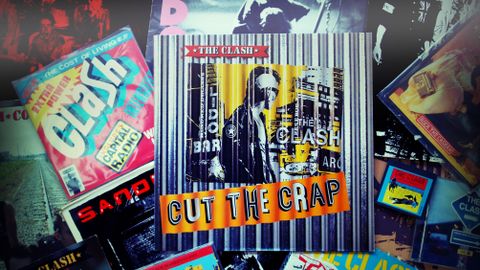If there was any justice in the world, right now, somewhere on a street corner in England someone would be holding Bernie Rhodes by the collar and kicking him repeatedly up the arse for what he did to Cut The Crap.
From the electric drums and synthetic horns of Dictator, its over-crowded dogs-dinner of an opener, the band’s last studio album is a chaotic, phoney jumble – and such a stain on The Clash’s name that, apart from anthemic single This Is England which appeared on 2005 best of The Essential Clash, it is rarely even acknowledged by the band themselves. (Official band documentary, Westway To The World, doesn’t mention it, choosing instead to pretend the band finished with the sacking of Mick Jones.)
It’s the only Clash album not to feature Jones and, boy, is he missed. With the Strummer-Jones writing credit now laughably transformed into Strummer-Rhodes (manager Bernie Rhodes, who was also in the production seat, credited as Jose Unidos), the balance between Jones’s ear for a melody and Strummer’s lyrical voice was a thing of the past.
Mick Jones had been the heart of the Clash – providing the emotion, the yearning, the melody, the groove – and without him, the band were reduced to a two-dimensional mess, a relic desperately trying to stay angry and relevant. Cut The Crap is left with the humourless, hectoring, slightly embarrassing side of The Clash, Strummer trying too hard to play the role of the angry punk, complete with mohican to help him get into character.
The band’s frontman was lost throughout this period, unable to connect with his new band members, guilt-laden at sacking Topper and Mick, and struggling to deal with the deaths of his parents. Sensing his weakness, Rhodes stepped in – Malcolm McLaren was making music, why couldn’t he? – and took over production duties. The result is an over-cooked pile of sonic spaghetti. Imagine Swing Out Sister produced by The Exploited and you’ll get some idea of the combination of yobbish terrace chant and soulless 80s production values. When Strummer heard it he flew to the Bahamas and begged Mick Jones – then recording the game-changing This Is Big Audio Dynamite – to rejoin The Clash. Jones, enjoying his freedom, laughed him off. You would’ve too.
Unable to stop it or fix it, Cut The Crap came out, unloved by the people who’d made it. It was shameful – and a shame. Bootlegs from the time caught a band on fire and show that some of the songs (Dictator, Are You Red…Y, Cool Under Heat) actually stand up. Rhodes doesn’t quite ruin the wistful protest song North And South – in the hands of Combat Rock producer Glyn Johns, say, it could have been a keeper – but really only This Is England survived Bernie’s cack-handed, cloth-eared skills at the desk.
The things that made This Is England seem pedestrian and cliched when it came out (the effects-heavy guitar sound, the terrace chorus, the lyric straining to make a big statement) somehow now give it classic status. 30 years on, it doesn’t seem as dumbly-obvious but more of a snapshot of Thatcher’s Britain, a dying gasp of protest as unemployment soared and the miners got crushed. It was The Clash’s last gasp too – a bitterly ironic anthem about the betrayal of a country, a nation failed by its leaders and turning on itself – a bit like The Clash themselves.
On a catwalk jungle
somebody grabbed my arm
A voice spoke so cold
it matched the weapon in her palm
This is England
This knife of Sheffield steel
This is England
This is how we feel…
The Clash Albums Ranked From Worst To Best – The Ultimate Guide


